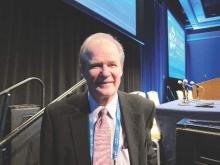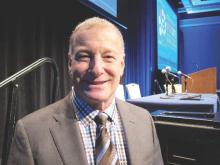Dr. Rubin predicted that the logistics of prescribing will be complicated by pharmaceutical marketing efforts. He noted the similar names of Remsima (Hospira) vs. Remicade (Janssen), Inflectra (Hospira) vs. infliximab generic. “It could be confusing for all of us.”
The question of how the drug will fare once inside the patient is still a matter of debate.
“The major issue is immunogenicity ... it’s impossible to predict in vitro,” said Dr. Brian Feagan, a copanelist with Dr. Rubin, and a professor of medicine at the University of Western Ontario in London, Canada. “Immunogenicity is determined by product-related factors, and a lot of clinical ones such as immunosuppression, coadministration, route of administration, disease-specific factors.”
The only way to truly determine the impact on immunogenicity of interchangeability, whether because of third-party payer stipulations or physician’s choice, is to do multiple switching trials, said Dr. Feagan.
But Dr. Stephen B. Hanauer, the Clifford Joseph Barborka Professor of Medicine in Gastroenterology and Hepatology at Northwestern University (Chicago), said that’s not likely to happen. “There’s no time for that as the FDA regulatory evaluation proceeds,” he said in an interview.
“The trial would take 2 years to accomplish, would need large numbers of patients in order to identify potential small differences, and would be too expensive.” All of which would defeat the purpose of the expedited approval process, Dr. Hanauer said, because the decision by Congress to give biosimilars the green light was to reduce cost.
On the other hand, said Dr. Feagan, the experiment on switching probably has already been done. That’s because despite what he referred to as efforts by pharmaceutical manufacturers to reassure physicians there is no drift from the original product, heterogeneity is inevitable.
These iterative qualities, according to Dr. Hanauer, essentially make the original products into biosimilars of themselves. Add to that, he said that depending upon the company used to perform the assays to determine immunogenicity, the range of results can vary widely, and you end up having to learn to live with a certain amount of uncertainty. “I’m not afraid of biosimilars,” Dr. Hanauer said while discussing biosimilars during an audience question time at the meeting.
“We are a little bit timid about biosimilars, but my sense is we will find our comfort level in the next few years, and we will start using them frequently,” Dr. Miguel Regueiro, medical director of the IBD Center at the University of Pittsburgh, said in an interview. “I think immunogenicity to biosimilars will be the same immunogenicity to the innovative biologics, but I don’t think we’re going to be comfortable with interchanging a biosimilar with a[n] original biologic because of the potential immunogenicity that can occur by switching between agents.”
Whether biosimilars can be used in place of their originals, said both Dr. Feagan and Dr. Hanauer, will come down to how extrapolated data is interpreted.
“I think the biggest debate the FDA is going to have [when indicating biosimilars for IBD] is overextrapolation,” Dr. Hanauer said in the interview. Since the FDA does not require clinical trials for biosimilars, but relies upon analytics instead, and because there are far less clinical data for biologics in IBD than there are for diseases such as rheumatoid or psoriatic arthritis, manufacturers will turn to those studies to demonstrate efficacy between originals and recombinants. “If 99.9% of the analytic assays and the clinical data in rheumatoid arthritis are virtually the same, I would assume that the data in inflammatory bowel disease is going to be virtually the same.”
However, at least in Canada, that was not the opinion of regulators who decided against approving the extrapolation of infliximab clinical data for indicating its biosimilar in IBD, but did allow extrapolation of the data for rheumatoid arthritis. “Health Canada decided that the antibody-dependent, cell-mediated cytotoxicity was different for IBD,” said Dr. Feagan.
Predicting the primacy of cost over keeping patients in remission, but at least for now, Dr. Rubin said the question of cost is “huge. Based on the European and Asian experience, the day one of these new products becomes available, the price of the existing therapies drops anywhere from 15% to 30%.”
Recent data places the cost of remission in the United States using infliximab at about $15,000.
Dr. Regueiro said these market forces are a good thing. “I don’t look at biosimilars in a negative context whatsoever. I think they are a necessary part of health care reform. Cost is definitely a driver, and that’s not bad.”




